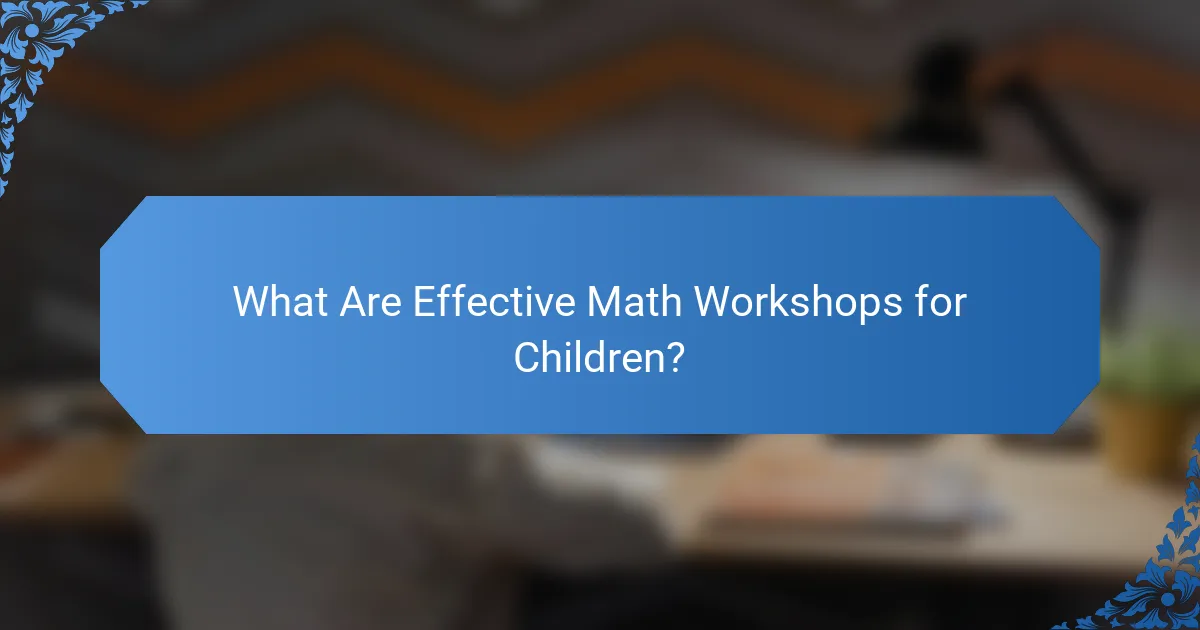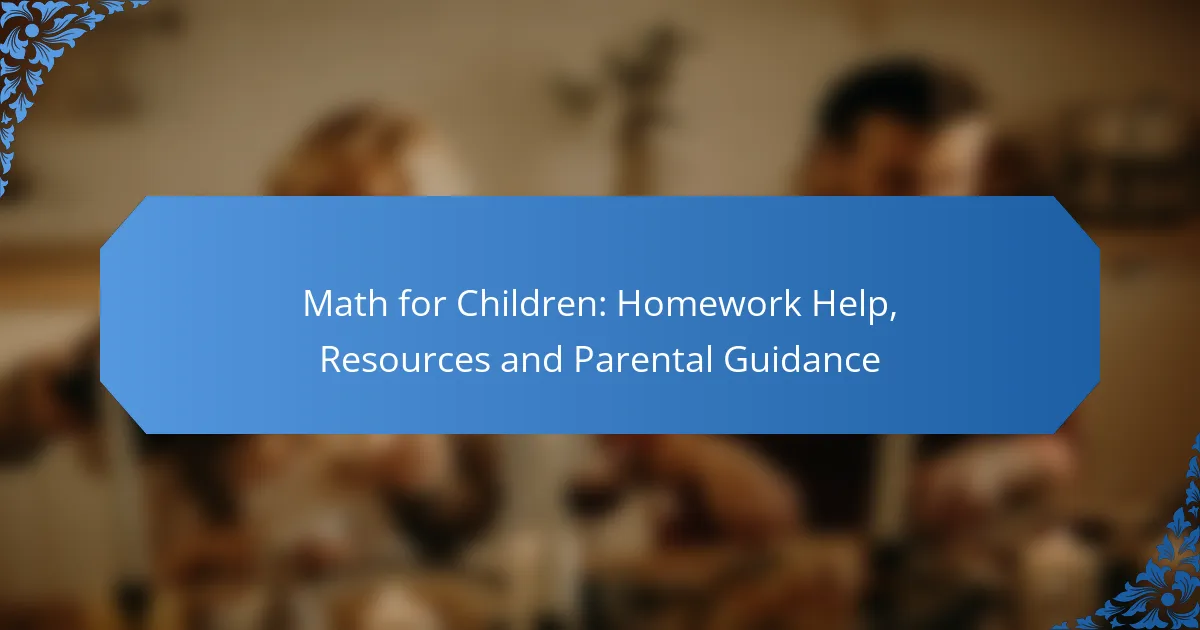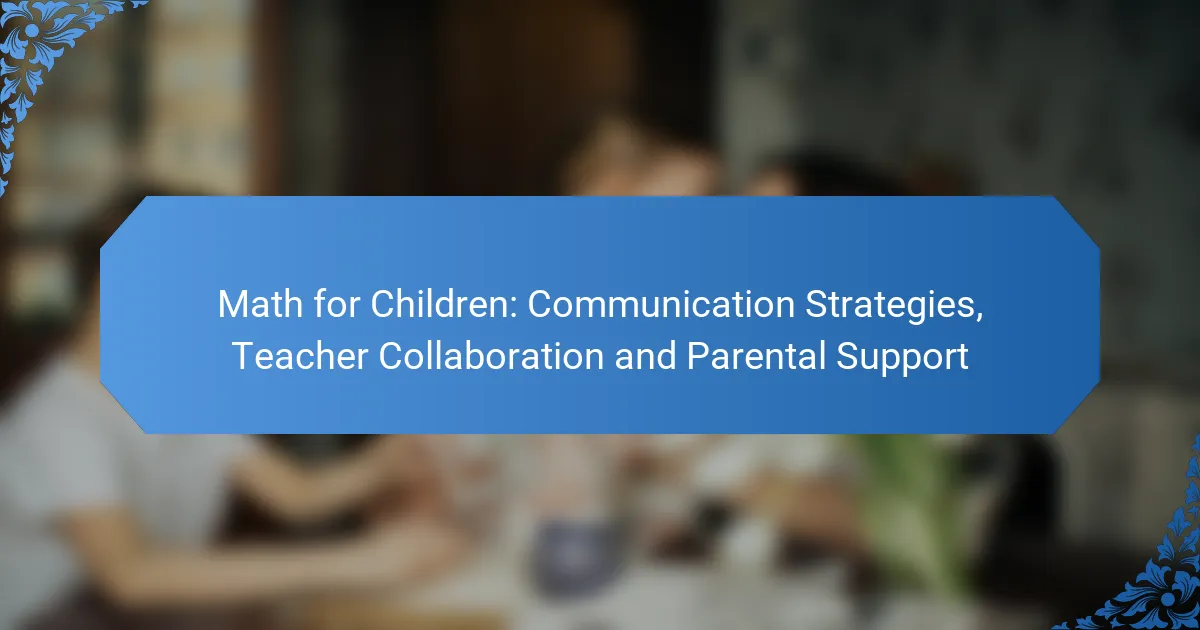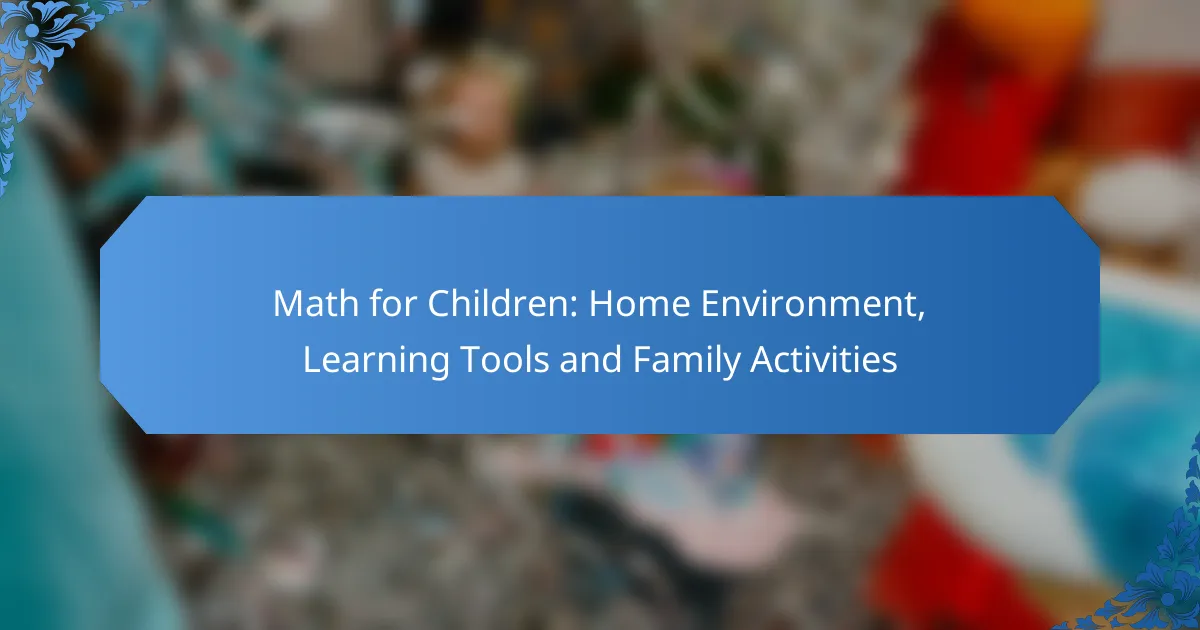Math for children can be greatly enhanced through engaging workshops that combine fun activities with structured learning. These interactive sessions not only make math concepts more accessible but also encourage parental involvement at home, creating a supportive environment for daily practice and exploration. By fostering a positive attitude towards mathematics, both workshops and home learning play a crucial role in a child’s mathematical development.

What Are Effective Math Workshops for Children?
Effective math workshops for children combine engaging activities with structured learning to enhance mathematical understanding. These workshops often include hands-on experiences, interactive games, and community involvement to foster a positive attitude towards math.
Hands-on activities
Hands-on activities are crucial in math workshops as they allow children to explore mathematical concepts through tangible experiences. For example, using blocks to teach addition and subtraction can make abstract concepts more concrete.
Incorporating everyday materials, such as measuring cups for fractions or string for geometry, can enhance learning. Aim for activities that encourage problem-solving and critical thinking, ensuring children actively participate rather than passively observe.
Interactive games
Interactive games make learning math enjoyable and can significantly improve children’s engagement. Games that involve competition or teamwork can motivate children to practice math skills in a fun environment.
Consider using board games like “Monopoly” for financial literacy or online math games that adapt to different skill levels. Ensure that the games are age-appropriate and align with the learning objectives of the workshop.
Online platforms like Prodigy Math
Online platforms such as Prodigy Math offer personalized learning experiences that adapt to each child’s skill level. These platforms provide a range of math problems and interactive scenarios that keep children engaged while they learn.
Encourage parents to incorporate these tools at home, as they can track progress and identify areas needing improvement. Many platforms offer free trials, making it easy to explore options before committing.
Local community centers
Local community centers often host math workshops that are accessible and affordable for families. These centers can provide a supportive environment where children can learn alongside their peers.
Check for programs that offer a mix of structured lessons and free play, allowing children to apply their skills in real-world contexts. Community centers may also provide resources for parents to support their children’s learning at home.
Summer camps
Summer camps focused on math can provide immersive learning experiences that reinforce skills while keeping children engaged during the break. These camps often blend academic learning with fun activities, such as outdoor math challenges or math-themed arts and crafts.
Look for camps that emphasize experiential learning and collaboration among peers. Parents should consider camps that offer a balance of structured activities and free exploration to cater to different learning styles.

How Can Parents Engage in Home Learning?
Parents can actively engage in home learning by creating a supportive environment that encourages daily math practice and exploration. This involvement not only reinforces concepts learned in school but also fosters a positive attitude towards mathematics.
Daily math practice routines
Establishing daily math practice routines can significantly enhance a child’s understanding of mathematical concepts. Aim for short sessions, around 15-30 minutes, to keep children focused and engaged. Consistency is key, so try to schedule these sessions at the same time each day.
Incorporate a variety of activities such as worksheets, flashcards, or online quizzes to maintain interest. Tracking progress can also motivate children; consider using a simple chart to mark completed tasks.
Utilizing educational apps like Khan Academy
Educational apps like Khan Academy provide interactive and personalized learning experiences that can complement traditional learning. These platforms often offer a wide range of topics and allow children to learn at their own pace, which can be particularly beneficial for reinforcing classroom lessons.
Encourage your child to spend a few minutes each day on these apps, focusing on areas they find challenging. Many apps also include progress tracking, which can help parents monitor their child’s development and adjust learning strategies as needed.
Incorporating math into daily activities
Integrating math into everyday activities can make learning more relevant and enjoyable. For example, cooking together can teach measurements and fractions, while shopping can provide opportunities to practice addition, subtraction, and budgeting.
Encourage your child to help with planning a family outing, calculating distances, or estimating travel times. These real-world applications not only reinforce math skills but also demonstrate the practical importance of mathematics in daily life.

What Are the Benefits of Math Workshops?
Math workshops provide numerous advantages for children, enhancing their understanding and enjoyment of mathematics. These interactive sessions foster engagement through hands-on activities, making math concepts more accessible and enjoyable.
Improved problem-solving skills
Participating in math workshops helps children develop better problem-solving skills by encouraging them to tackle challenges collaboratively. Through group activities and guided exercises, they learn to approach problems from different angles and apply various strategies.
For instance, workshops often include puzzles and games that require critical thinking, allowing children to practice and refine their skills in a fun environment. This hands-on approach can lead to a deeper understanding of mathematical concepts.
Enhanced social interaction
Math workshops create opportunities for children to interact socially with their peers, which can significantly enhance their communication skills. Working in groups allows them to share ideas, explain their thought processes, and learn from one another.
This social aspect not only makes learning more enjoyable but also helps children build friendships and develop teamwork skills. Engaging with others in a supportive environment can lead to a more positive attitude toward math.
Boosted confidence in math
Regular participation in math workshops can significantly boost a child’s confidence in their mathematical abilities. As they successfully solve problems and engage in discussions, they begin to see their own potential and capabilities.
To maximize this benefit, parents can encourage their children to attend workshops consistently and celebrate their achievements, no matter how small. This positive reinforcement helps to cultivate a lasting confidence in their math skills, which can carry over into their academic performance.

What Criteria Should Parents Consider for Math Courses?
Parents should evaluate several key factors when selecting math courses for their children, including the appropriateness of content for their child’s age, the qualifications of the instructor, and the format of the course, whether online or in-person. These criteria can significantly influence the effectiveness and enjoyment of the learning experience.
Age-appropriate content
Age-appropriate content is crucial for keeping children engaged and ensuring they grasp the material. Math courses should align with developmental stages, introducing foundational concepts in early years and gradually increasing complexity as children mature. For example, younger children might focus on basic addition and subtraction, while older students tackle algebra and geometry.
When assessing content, consider the curriculum standards in your region, such as the Common Core in the United States or the National Curriculum in the UK. These frameworks provide guidance on what children should learn at each grade level, helping parents choose suitable courses.
Instructor qualifications
The qualifications of the instructor can greatly impact a child’s learning experience. Look for educators with relevant degrees in mathematics or education, as well as experience in teaching math to children. Certifications or training in child development can also be beneficial.
Additionally, consider the instructor’s teaching style and ability to engage students. Reading reviews or testimonials from other parents can provide insights into how well the instructor connects with children and makes learning enjoyable.
Course format (online vs. in-person)
Choosing between online and in-person courses depends on your child’s learning preferences and your family’s schedule. Online courses offer flexibility and can be accessed from home, making them convenient for busy families. However, they may lack the interactive elements that in-person classes provide.
In-person courses often foster a collaborative environment where children can engage directly with peers and instructors. Weigh the pros and cons of each format, considering factors like your child’s social needs, the availability of local classes, and your budget. Some parents find a hybrid approach, combining both formats, to be effective in providing a well-rounded learning experience.

How Do Math Workshops Support Learning Styles?
Math workshops cater to various learning styles, enhancing children’s understanding and retention of mathematical concepts. By incorporating different teaching methods, these workshops can effectively engage visual, auditory, and kinaesthetic learners.
Visual learning through manipulatives
Visual learners benefit significantly from manipulatives, which are physical objects that help illustrate mathematical concepts. Tools like blocks, counters, and geometric shapes allow children to see and touch the math they are learning, making abstract ideas more concrete.
For example, using blocks to demonstrate addition or subtraction can help children visualize the process, reinforcing their understanding. Workshops should include a variety of manipulatives to cater to different topics and age groups, ensuring that visual learners can engage fully.
Auditory learning via group discussions
Auditory learners thrive in environments where they can hear and discuss ideas. Group discussions during math workshops encourage children to articulate their thought processes and listen to their peers, which enhances their comprehension and retention of mathematical concepts.
Facilitators can promote dialogue by posing open-ended questions and encouraging students to explain their reasoning. This method not only helps auditory learners but also fosters a collaborative learning atmosphere that benefits all participants.
Kinaesthetic learning through activities
Kinaesthetic learners excel when they can physically engage with the material. Math workshops that incorporate hands-on activities, such as games or movement-based tasks, allow these learners to explore concepts actively rather than passively absorbing information.
Activities like scavenger hunts for shapes or measuring objects around the classroom can make math enjoyable and relatable. It’s essential to design these activities to align with specific learning objectives, ensuring that kinaesthetic learners can connect their experiences back to the mathematical principles being taught.

What Are Popular Online Math Learning Tools?
Popular online math learning tools include interactive platforms that engage children through games, videos, and exercises. These tools often cater to various age groups and skill levels, making math accessible and enjoyable for learners.
Khan Academy
Khan Academy offers a comprehensive range of math lessons from basic arithmetic to advanced calculus. The platform features instructional videos, practice exercises, and personalized learning dashboards that help students track their progress. Parents can monitor their child’s performance and adjust learning paths accordingly.
Prodigy Math
Prodigy Math is a game-based learning platform that combines math practice with an engaging fantasy adventure. Students solve math problems to progress through the game, which helps maintain their interest. Prodigy is suitable for grades 1-8 and aligns with common core standards, making it a great tool for both home learning and classroom use.
IXL
IXL provides a comprehensive math curriculum that adapts to each student’s level. The platform offers unlimited practice questions and immediate feedback, allowing learners to improve their skills at their own pace. IXL covers a wide range of topics and is available for various grade levels, making it a versatile option for parents and educators.
Mathletics
Mathletics combines curriculum-aligned content with engaging activities and competitions. It offers a variety of resources, including interactive games and challenges that motivate children to practice math. The platform is suitable for students from preschool to high school, and it provides detailed reports for parents to track progress.
DreamBox Learning
DreamBox Learning is an adaptive math program designed for students in kindergarten through eighth grade. It adjusts the difficulty of lessons in real-time based on student responses, ensuring personalized learning experiences. DreamBox emphasizes conceptual understanding and problem-solving skills, making it a valuable resource for home learning.



